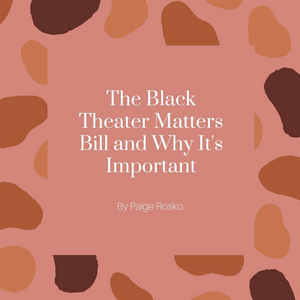Student Blog: The Black Theater Matters Bill and Why It's Important
You've seen the words "Black Theater Matters Bill" floating around Instagram, but what is it really?
 Recently, the Actors' Equity Association held its first annual convention. During this convention, actors' rights, benefits, and more were discussed. One of the most popular bills introduced during this convention was the Black Theater Matters Bill. I am going to break it down by article and say why I think this bill is so important for the industry.
Recently, the Actors' Equity Association held its first annual convention. During this convention, actors' rights, benefits, and more were discussed. One of the most popular bills introduced during this convention was the Black Theater Matters Bill. I am going to break it down by article and say why I think this bill is so important for the industry.
The first article is the "AEA History Restoration and Preservation Act". This act recommends that a History Restoration and Preservation Committee is created to collect, restore, preserve, and utilize all past, present, and future records from AEA. The committee would also collect and restore any graphics, literature, or media, from AEA.
The second article is the "Education Act". This act would have the previous committee create both college and high school level curriculums focused on the history of the union. The article also lists contracts and rulebooks that could be used to study.
The third article is the "Under the Umbrella Act". Under this act, AEA will recommit to organizing all Spanish-speaking theaters. AEA will also commit to a bilingual approach in all communication to any Spanish-speaking theaters or theaters with bilingual options. AEA will also claim jurisdiction over all drag performers who work on a theatre stage or in a structured show.
The fourth article is "Environmental Sustainability Through Digital Engagement". This article discusses how AEA will create a bi-annual physical card that members can purchase. Also, the current signup time for Equity Principal Auditions and Equity Chorus Calls, which is currently noon, will be suspended. An Audition Systems Committee will be created and made up of 50% AEA members and 50% Casting Society of America members. This committee will create a joint digital app designed to make a new audition system.
The fifth article is "The Equity Spectrums". This article details a "Green Book" created by AEA that will track the hiring practices of all of the AEA's bargaining partners. This information will be available in an easily searchable database and will be shared with union members, donors, and audience members.
The sixth article is titled "10,000 Hours". This article says that anyone who does puppetry work, or any specialized skill set, will result in the actor being paid no less than a fair percentage of the minimum actor salary plus their weekly salary.
The seventh article is "The Strategic Plan". This article discusses how members in good standing should vote on the AEA name change during the 2022 election cycle and how members should have a say in if AEA should merge with other unions.
The eighth article is the "Lift Every Voice Act". This act would have AEA keeping a digital option available for all of their meetings and having the Executive Director and President of AEA hold open office hours. This act also says that candidates running in the biennial election will have to be given the opportunity to join either an open forum, town hall, or debate.
The ninth article is the "Growth and Prosperity Act". This act discusses how AEA should only invest in land or buildings if they put out a plan that proves the investments will be self-sustaining.
The tenth article is the "Fallen Soldier Act". This act states that every member in good standing will have their name, picture, and obituary shared in remembrance across all of the AEA social media platforms.
The eleventh article is titled "Agent of Reconciliation". This article says that AEA will honor the First Nations by stating the native name for any Americanized land mentioned in all AEA communications.
The twelfth and final article is called "Black Lives Still Matter." This article discusses the June 2020 Black Lives Matter Resolution and how the wording should be changed to create a more equitable workplace.
Personally, I think the most important things to come out of this bill are the History Restoration and Preservation Committee and the Under the Umbrella Act. This new committee now is going to be able to share the history of AEA with people from an unbiased point of view. It is going to help people learn about the good and bad times in theater history and what we can do better. The Under the Umbrella Act is important because it wants to create a more open industry for Spanish-speaking and bilingual theaters, which is not something that has been done before. If these theaters are given the same rights and acknowledgments as English-speaking theaters, then we will possibly see a growth in inclusive theaters.
These twelve articles all discuss how AEA can work to make this industry more equitable for everybody and what steps should be taken next. While it might take a while for these acts to be implemented, it is important to understand that speaking out and taking action does create change. This is the start of creating a safe and equitable workplace for everyone in the industry.
Videos


